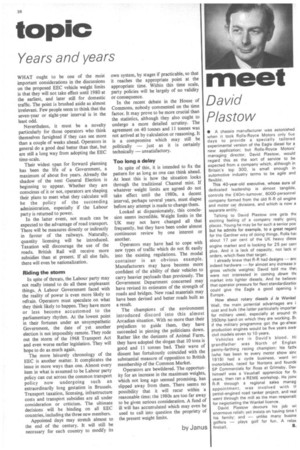topic
Page 38

If you've noticed an error in this article please click here to report it so we can fix it.
Years and years
WHAT ought to be one of the most important considerations in the discussions on the proposed EEC vehicle weight limits is that they will not take effect until 1980 at the earliest, and later still for domestic traffic. The point is brushed aside as almost irrelevant. Few people seem to think that the seven-year or eight-year interval is in the least odd.
Nevertheless, it must be a novelty particularly for those operators who think themselves farsighted if they can see more than a couple of weeks ahead. Operators in general do a good deal better than that, but are still a long way from adopting the EEC time-scale.
Their widest span for forward planning has been the life of a Government, a maximum of about five years. Already the shadow of the next General Election is beginning to appear. Whether they are conscious of it or not, operators are shaping their plans to meet what they calculate will be the policy of the succeeding administration, especially if the Labour party is returned to power.
In the latter event, not much can be expected to the advantage of road transport. There will be measures directly or indirectly in favour of the railways. Naturally, quantity licensing will be introduced. Taxation will discourage the use of the roads. British Rail will receive more subsidies than at present. If all else fails, there will even be nationalization.
Riding the storm In spite of threats, the Labour party may not really intend to do all these unpleasant things. A Labour Government faced with the reality of power is even more likely to refrain. Operators must speculate on what they think likely to happen. They have more or less become accustomed to the parliamentary rhythm. At the lowest point in their fortunes under an unsympathetic Government, the date of yet another election is not impossibly remote. They rode out the storm of the 1968 Transport Act and even worse earlier legislation. They will hope to do as much again.
The more leisurely chronology of the EEC is another matter. It complicates the issue in more ways than one. Almost every item in what is assumed to be Labour party policy can cut across the common transport policy now undergoing such an extraordinarily long gestation in Brussels. Transport taxation, licensing, infrastructure costs and transport subsidies are all under consideration or criticism. The ultimate decisions will be binding on all EEC countries, including the three new members.
Appointed days may stretch almost to the end of the century. It will still be necessary for each country to modify its own system, by stages if practicable, so that it reaches the appropriate point at the appropriate time. Within this time scale, party policies will be largely of no validity or consequence.
In the recent debate in the House of Commons, nobody commented on the time factor. It may prove to be more crucial than the statistics, although they also ought to undergo a more detailed scrutiny. The agreement on 40 tonnes and 11 tonnes was not arrived at by calculation or reasoning. It is a compromise which may still be politically — just as it is certainly technically — unsatisfactory.
Too long a delay In spite of this, it is intended to fix the pattern for as long as one can think ahead. At least this is how the situation looks through the traditional Channel mist. If whatever weight limits are agreed do not take effect until the 1980s, a decent interval, perhaps several years, must elapse before any attempt is made to change them.
Looked at dispassionately, this conclusion seems incredible. Weight limits in the UK may not have changed all that frequently, but they have been under almost continuous review by one interest or another.
Operators may have had to cope with new types of traffic which do not fit easily into the existing regulations. The modal container is an obvious example. Manufacturers may have become more confident of the ability of their vehicles to carry heavier payloads than previously. The Government Department concerned may have revised its estimates of the strength of roads and bridges. New road materials may have been devised and better roads built as a result.
The champions of the environment introduced discord into this almost Arcadian situation. With no more than their prejudices to guide them, they have succeeded in pinning the politicians down. Rather like the denizens of Animal Farm, they have adopted the slogan that 10 tons is good and 11 tonnes bad. Their wave of dissent has fortuitously coincided with the substantial measure of opposition to British membership of the Common Market.
Operators are bewildered. The opportunity for an increase in the maximum weights, which not long ago seemed promising, has slipped away from them. There seems no possibility that it will recur within a reasonable time; the 1980s are too far away to be given serious consideration. A fund of ill will has accumulated which may even be used to call into question the propriety of the present weight limits.
by Janus




































































































